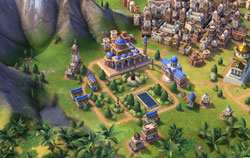Anyone who’s ever played the board game Risk would understand the basic premise of Civilization VI gameplay, and that of 4X strategy games in general. Civilization VI (or Civ VI) is the latest entry in the Civilization series of videogames. Like its predecessors, it belongs to the 4X subgenre of strategy games. In a 4X strategy game, the player is put in charge of a faction which they control through turn-based gameplay. Typically the goal of this is advancement/development of the faction despite competition from other factions. In the case of Civilization VI, players control a nation, like America or India, as a historical figure/leader, such as Teddy Roosevelt or Gandhi. What sets Civ VI and most other 4X games apart from Risk is the amount of overlapping in-game systems, which add complexity to the title.
The best way to explain Civilization VI would be to describe how a typical session plays out. Civ VI is session based, which means that when you want to play it, you select a number of options to create a match. You could set up a simple game and only edit things such as which leader/civilization you play, game speed (whether the game takes 2 hours or 50 hours to finish), AI difficulty (human opponents/multiplayer is also a possibility, and these opponents can even be mixed in with AI), and so forth. There is also “advanced setup,” which provides more options for game design, such as picking which leaders the AI plays, eliminating victory conditions (one could make a victory through religious prosperity impossible, for example), and further altering the world design (such as rainfall, world age, sea levels, and abundance of resources).
In one of my Civ VI sessions, I elected to play Trajan, a Roman emperor. I set up a standard continents map, set to massive map size, normal game speed, and King AI difficulty (medium, leaning hard). I was placed inland, in an area of fertile farmland near a river and some hills. In some ways, this was an ideal spot to establish my first city (Rome) as it would grow quite quickly and allow me to found new cities/establish a foothold before my AI competition. In no time at all, I had established two more cities—one near the first for added security, another farther away on a coast for future naval operations.
Next, when it came time to declare war, I chose to use Casus Belli, a new in-game system which allows me to represent reasons for going to war and thus prevent myself from appearing a warmonger; unfortunately, there was no option for “he built in my territory,” (there should be) but I was able to declare a liberation war, as Pedro had previously conquered a city from one of my friendly civilizations.
This war actually angered Ghandi and he began a campaign of religious aggression against me. I used diplomatic options to tell him to stop it, and he agreed, but then he went back on his word, three times in a row. Long story short, I declared war on Ghandi and ended up eliminating his civilization. Thankfully, some of my more tolerant neighbors had grown to admire my civilization’s culture and as a result, were willing to overlook this small act of genocide. In the end, I was able to play through the rest of the game mostly peacefully and win a cultural victory, largely due to late-game tourism.
Those who have played Civilization titles before may be wondering how Civ VI differentiates itself from previous titles. Title-specific improvements/districts provide strategic depth and are a much-needed breath of fresh air for the series. Then there’s the graphics, which appear to have gone for a more fantasy/animated aesthetic rather than the realism of previous series. I don’t know if future titles beyond Civ VI will embrace this, but I found it refreshing. I’d also praise this title for the generous amount of content it shipped on day one; by comparison, Civ V felt lacking on release, so I’m glad to see this didn’t become a trend in the game series.
Unfortunately, this newest title contains many of the same issues which plagued earlier ones. Certain leaders/civilizations have imbalanced perks, certain paths to victory feel favored and AI behavior is often erratic/irrational. There are also some new issues with this title, unit/city automation has essentially been removed from the game, which, in my mind, is a serious problem. Late-game, when I have an entire continent under my control and more than 20 cities, managing all this becomes a chore. In Civ V, I could automate workers/cities to build improvements without my oversight; in Civ VI, this option has been removed, which makes the average game last several hours longer.
I’m also not a fan of the new “religious combat.” It feels like this system was basically ripped off from traditional military combat (not to mention summoning lightning bolts on other religious units feels very out-of-place in a supposedly historical video game). The religion system of Civ V was functional enough without combat; it feels like Firaxis fell into the trap of fixing something that wasn’t broken just so that the game would have more content. It would have been easy to add more depth to some other system, such as allowing some rivers to support harbors/ships. This would add depth to a number of in-game systems without seeming contrived.
Civilization VI certainly has its issues, and unfortunately many of these are the same issues that earlier Civ games had. That being said, it’s still a Civ game, and it has enough new content/features to make it well-worth playing. I’d score it at an 8.5/10, which in my book, is quite good. Just for clarity, I’ve been a little harsher on Civ VI than most; several of my friends who’ve put hundreds of hours into the series feel that this game is the best Civilization title to date, and a definitive masterpiece. Suffice it to say, if this game sounds at all interesting to you, I’d strongly recommend it.
IMAGE TAKEN from Civilization




